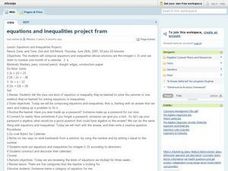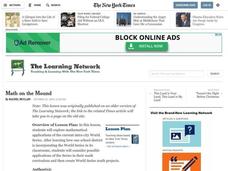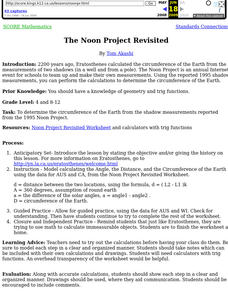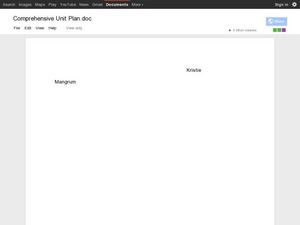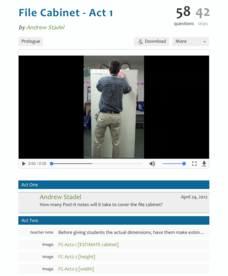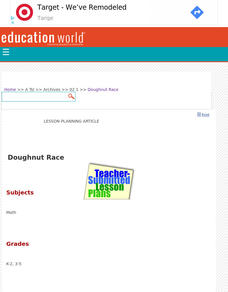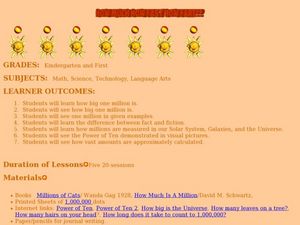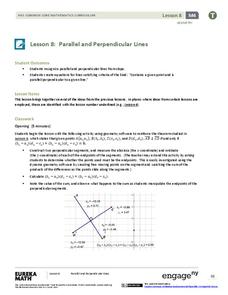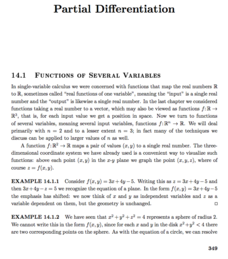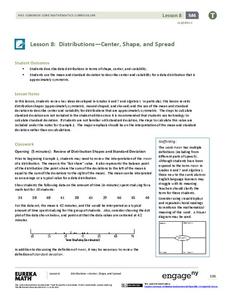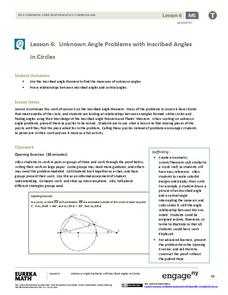Curated OER
Equations and Inequalities Projects
Students compose equations and inequalities whose solutions are the integers 1-31 and utilize them to number one month of a calendar. They take notes on two ways to work backwards from a solution: by using the number and by setting x...
Curated OER
Evernote
Here is an app version of a powerful tool that allows you and your students to have one place where you can capture, organize, and share items in multiple media formats. The different uses for this app are as varied as your ideas and...
Mary Pope Osborne, Classroom Adventures Program
Mummies in the Morning Egyptian pyramids, hieroglyphics
Visit the Magic Treehouse and take your class on a trip through time with a reading of the children's book Mummies in the Morning. Using the story to spark an investigation into Egyptian culture, this literature unit engages...
Curated OER
Notes to Quadratic Equations
In this quadratic equations worksheet, students read notes about graphing, factoring, square roots, completing the square, and the quadratic formula. Students read 2 1/2 pages of notes.
Curated OER
Take A Chance Or Two
A two-part lesson immerses young statisticians in the concept of probability. On the first day, will conduct experiments with a two-colored coin and learn how to write probabilities as fractions, ratios, and percentages. In the second...
Curated OER
Math on the Mound
Students explore mathematical applications of the current intra-city World Series. After learning how one school district is incorporating the World Series in its classrooms, students consider possible applications of the Series in their...
Curated OER
Noon Project Revisited
Students, just like Eratosthenes, try to use math to calculate immeasurable objects. Teachers need to try out the calculations before having your class do them. They should take notes to be included with their own calculations and drawings.
Curated OER
Graphing Ordered Pairs On A Coordinate Plane
Sinking ships, construction paper, coordinate planes, sounds like fun day in math class. Play the game Battleship with your class and reinforce the concept of graphing ordered pairs.
Curated OER
Worksheet 7 Computer Lab
In this math worksheet, students program the computer to display a direction field plot for an equation. They plot several solutions on a graph.
BW Walch
Linear & Exponential Functions
Positioned inside the framework of linear and exponential functions, this lesson is more of an investigation into the effects of changing variables and constants inside an expression. The author takes familiar formulas, those for...
Curated OER
Tic-Tac-Toe Note Organizer
In this organizer worksheet, students divide a sheet of paper into nine tic-tac-toe sections on which to take notes. The worksheet is a generic, blank graphic organizer.
Curated OER
The Life Cycle of the Mealworm
Fourth graders provide a habitat for live mealworms and observe their life cycle. In this animal life cycle and scientific inquiry lesson plan, 4th graders create a habitat for a live mealworm and observe and record related data as it...
Curated OER
World in the Balance
Young scholars make estimates on how many people they believe live on Earth. While watching a video, they take notes on the issues facing Kenya, Japan and India. In groups, they calculate how long it takes for a country to double in...
Curated OER
Goody Bags
Looking for Common Core math center ideas for your Kindergartners? This a great one that is easy to set up, change up, and can be individualized to the learning level of each child. Start with a collection of zippered plastic bags and...
101 Questions
File Cabinet
Take the resource out of the file cabinet. Young mathematicians estimate the number of sticky notes it would take to cover the surface area of a file cabinet. They answer a set of questions on how the number of sticky notes would change...
Curated OER
Doughnut Race
Pupils will practice math facts in this fast-paced and fun "Doughnut Race." This fun activity has learners practice their math facts in a face paced game environment. It can be adapted to all mathematical operations by using a poster...
Math Can Take You Places
Picture This
Engage scholars in a ratio lesson that employs real-world scenarios. Learners will compare the length and width of pictures and use a table to identify ratio patterns. They watch "Math Can Take You Places" and discuss jobs that use math...
Curated OER
How Much, How Fast, How Far?
Students investigate the concept of the number one million. In this number concepts lesson, students read the book How Much is a Million? and brainstorm questions, such as "how many leaves are on a tree" and "how many hairs are on your...
EngageNY
The Graph of the Equation y = f(x)
Math language? Set notation is used in mathematics to communicate a process and that the same process can be represented as computer code. The concept to the loop in computer code models the approach pupils take when creating a solution...
EngageNY
Parallel and Perpendicular Lines
Use what you know about parallel and perpendicular lines to write equations! Learners take an equation of a line and write an equation of a line that is parallel or perpendicular using slope criteria. They then solve problems to...
Gatsby Charitable Foundation
Four Activities Using Straight Line Graphs
This math packet includes four different activities which puts linear equations and line of best fit in the context of real world applications. Each activity uses a different linear math modeling equation and asks the learners to...
Whitman College
Calculus - Early Transcendentals
This textbook takes the learner from the basic definition of slope through derivatives, integrals, and vector multivariable calculus. Each section is composed primarily of examples, with theoretical introductions and explanations in...
EngageNY
Distributions—Center, Shape, and Spread
Data starts to tell a story when it takes shape. Learners describe skewed and symmetric data. They then use the graphs to estimate mean and standard deviation.
EngageNY
Unknown Angle Problems with Inscribed Angles in Circles
We know theorems about circles—now what? Class members prove a theorem, with half the class taking the case where a point is inside the circle and half the class taking the case where a point is outside the circle. The lesson then...


